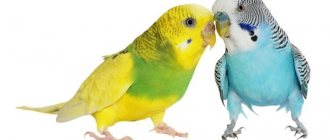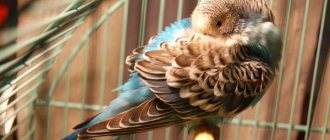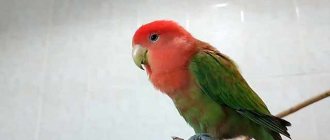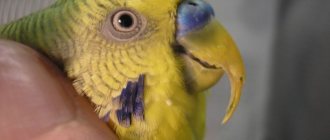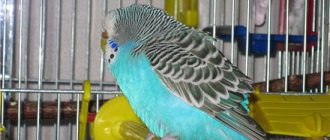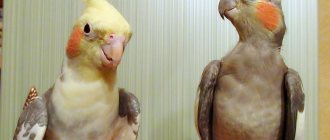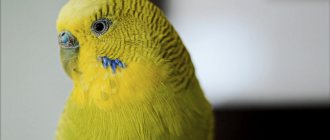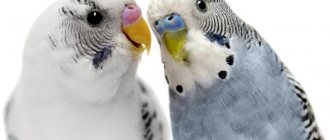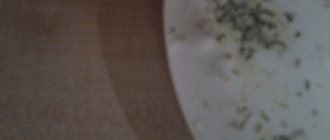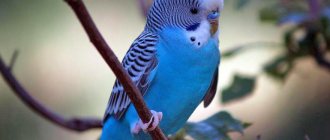It’s good when our pets make us happy and lift our spirits in difficult times, but what should we do if our budgie gets sick? The whole difficulty lies in the fact that our pets cannot tell us when they feel bad and what hurts. Our task as owners is to closely monitor the health of our charges so that they please us for many years. Most of the diseases of budgies occur as a result of improper care: the wrong food, dirt in the cage, draft in the room, not fresh water, not washed vegetables, careless handling, etc.
A healthy bird is distinguished by active behavior, shiny eyes, and smooth, shiny feathers. The bird shows interest in what is happening and “talks” - these are signs of a healthy bird. If everything is fine with the pet, he will definitely take care of himself by cleaning his feathers.
In order for him to continue to remain healthy, it would be a good idea to conduct regular examinations for diseases or parasites. Particular attention should be paid to the eyes, beak, paws and secretions.
How to give medicine to a parrot
The medicine is mixed into the food. It is best if the veterinarian determines the daily dose individually. It depends on the age, type, size and disease of the bird. It is important to know that if you decide to treat a bird yourself, and the bird refuses to eat food and water, then the medicine must be forcibly administered through a syringe (without a needle).
The solution is poured through the corner of the beak very slowly so that the bird does not choke. The veterinarian usually uses a probe or intramuscular injection to administer the medication orally.
Video: how to give medicine to a parrot's beak
What should a bird owner be able to do?
1. Learn to convince your pet to take the pill. When your feathered friend is healthy, this measure may seem strange. But in a situation where it turns out that the bird must eat a crushed tablet or drink liquid medicine, and the owner cannot force it, this will turn out to be real torment for both the bird and the owner himself. What to do? From the very moment the parrot appears, it is necessary to teach it to drink and eat juice, puree or any other food that is pleasant to the bird from a teaspoon.
2. Fix the bird. This will be necessary for examining the parrot or for possible transportation of the feathered pet to the clinic. The best way to learn this is with a bird in the form of a game where you wrap it in a towel or the bird allows you to spread its wings and let you feel the keel and muscles.
3. Conduct regular preventive examinations of the parrot with a doctor. Such examinations can identify slowly developing chronic diseases and stop them in a timely manner.
4. Remember that a sick bird loses heat very quickly. It is necessary to warm the parrot using a lamp, a heating pad, or an electric heater. Exceptions: Birds should not be warmed if they have nosebleeds, concussions, or strokes.
5. Be prepared for the fact that treatment may be expensive. Visits to the doctor, medications themselves, tests, diet adjustments - all this requires funds.
Remember that the successful recovery of your feathered pet depends on the speed of your actions! Take care of your birds!
Common disease in parrots: self-plucking and feather eating
This is a fairly common disease in pets kept in poorly ventilated enclosed spaces.
. If the disease starts, it will be very difficult to rid your pet of the habit of pulling out feathers.
Diseases leading to self-plucking:
- giardiasis;
- stress.
But self-plucking rarely involves just one factor. Often this problem is cumulative. Thus, trouble can come in the event of poor nutrition, insufficient bathing, infringement of the rights of birds, poisoning, chronic bacterial infections, hormonal fluctuations, food allergies, etc.
You yourself are unlikely to find the cause of self-plucking, so a trip to the veterinarian is mandatory. Feather pulling cannot be caused by behavioral factors alone. In any case, there is at least one physiological reason!
Regrowth of beak and claws in parrots
Tree branches, mineral stone, and chalk are excellent solutions for preventing overgrowth of claws and beaks. In advanced situations, you need to go to a veterinary clinic, where the doctor can perform circumcision.
Video: how to trim a budgerigar's beak (careful, if you're not sure, don't try it!)
Parasites
Considering what diseases there are in budgies, symptoms and treatment, one cannot ignore the topic of parasites. Parrots sometimes become victims of internal or external parasites. Some of them are easy to spot when interacting with the bird. Other parasites become noticeable only after their presence begins to greatly affect the condition of the bird. For example, the owner will have no problem noticing that the pet is losing its feathers. Someone may live in a bird's intestines. In this case, to determine the presence of parasites, you need to notice the accompanying symptoms.
Poisoning in parrots
In case of poisoning and dehydration (usually characterized by diarrhea, vomiting), a 5% glucose solution is used: for small parrots - 0.2-0.4 ml per beak 1-3 times a day for a week, for medium parrots - 1-2 ml 2 -3 times a day for a week, for large parrots and birds - 4-15 ml 2-3 times a day for a week.
It is best to discuss the exact dosage with your veterinarian; when treating yourself, remember the main rule - do no harm!
The cause of poisoning can be anything: from table salt to household chemicals.
Whatever the cause of the poisoning, if you observe diarrhea, cramps and severe thirst in your bird, then you should give your pet an absorbent as soon as possible, which will help reduce the level of toxins in the body. It can be activated carbon, enterosgel, smecta
.
It is also recommended to heat the bird with a lamp (table lamp, for example) and add a few drops of citrus juice to the drinker.
What treatment options are there?
To begin with, it is recommended to contact specialists. Only they will be able to accurately and quickly make the correct diagnosis and prescribe adequate therapy.
If it is an infection, you will definitely need an antibiotic. As well as anti-inflammatory drugs, drugs that increase immunity, it is possible to prescribe homeopathic drugs. The duration of taking medications and their dosage will also be prescribed by the treating specialist.
If it comes to non-contagious pathologies, then it is necessary to establish the source of the disease, eliminate it, and then begin treatment of the accompanying symptoms, which will alleviate the general condition.
The main reason is poisoning; adsorbent agents and enzymes (activated carbon, Smecta) are recommended for use. To restore intestinal flora - “Linex”. For bleeding, use the hemostatic agent “Ditsinon”, a decoction of nettle and chamomile. For kidney infections - Vitasol.
When infected with ectoparasites, Aversectin ointment is effective, as well as “Insektol” and “Clandestine” sprays.
Colds and acute respiratory viral infections should be treated by heating, drinking herbal decoctions, and children's syrups.
During the treatment period, it is also important to monitor proper nutrition, its variety, and, if necessary, add vitamin supplements. Follow all doctor's instructions, pay attention to your pet's reaction to the administration of medications, so as not to miss the development of allergies and edema.
And, most importantly, remember that any disease is easier to prevent than to treat, everything here is the same as in people. Take care of your birds and they will respond to you with kindness and affection!
Macaw parrot: DESCRIPTION, PHOTO, CARE, CONTENT, FOOD
PARROT AMAZON: DESCRIPTION, PHOTO, CARE, CONTENTS, LIFESTYLE
COCKATOO: PHOTOS, CARE AND MAINTENANCE AT HOME, DESCRIPTION
Lovebirds: DESCRIPTION, PHOTO, CARE, CONTENT, FEEDING
Frequent vomiting, constipation and diarrhea in a parrot
Such symptoms usually indicate poisoning of the bird. But pathological vomiting should not be confused with natural regurgitation. If a parrot is poisoned, it begins to burp frequently after eating. And many bird owners don’t know what to do and what causes this phenomenon.
It could be:
- the result of overfeeding a pet;
- lack of vitamins;
- improper diet;
- diabetes;
- liver pathologies;
- peritonitis;
- poisoning by toxins;
- parasites.
Birds often develop diarrhea after vomiting. This is the result of salmonella infection. If a bird is severely dehydrated, it quickly weakens and may even die. In such cases, if the parrot is diarrhea and the owner does not know what to do, you should contact a veterinarian as soon as possible.
Birds can become infected with salmonellosis through contaminated food or dirty water. He has an increase in temperature, as well as apathy, blue beak and paws, liquid frequent green-yellow diarrhea interspersed with blood.
Causes of loose stools in parrots:
- Lack of microelements, goiter inflammation, fungus, dysbacteriosis or infection - undigested food in the form of small particles is present in the stool.
- A disorder in the gastrointestinal tract, a disease of the nervous system - black droppings with a large amount of liquid.
- Kidney failure or arthritis - a large number of white specks in the stool.
- Poisoning or parasites (liver affected) - bright green, yellow droppings.
- Overfeeding with fatty foods (the pancreas is affected) - white-gray droppings.
- The presence of parasites in the liver, lack of microelements - green liquid. You need to see a doctor urgently!
- If blood is found in the stool and you did not feed your pet beets, then in this case you should also immediately visit a veterinarian.
Causes of constipation in parrots:
- Poor quality food.
- Lack of water.
- Stress.
- Dirty cage.
- Eating inedible objects.
- Parasites that cause bloating.
- Fatty food.
- The owner does not let the bird fly.
If a parrot is constipated, many experienced parrot lovers advise this is what to do in this case: pour smecta through a syringe (pre-dilute the medicine in a small amount of water and drink 1 ml about once an hour), give liquid food and water.
You can also give 2-3 drops of castor or vaseline oil into the beak. In severe cases, you can try introducing 3-4 drops into the cloaca and massaging the tummy. But it’s still better to consult a veterinarian to avoid injury.
To prevent constipation in a parrot, the food should contain flaxseeds, vegetables and fruits.
Video: coughing and vomiting in a budgie
Causes of diseases
Everyone knows that budgies are unpretentious birds that are suitable for keeping at home, but you still need to know their main diseases and methods of treatment. Many of them are dangerous and can be fatal. And in order to avoid them, it is necessary to study the main factors that provoke them:
- Incorrect content;
- Lack of hygiene;
- Non-compliance with feeding regimen;
- Improper cage cleaning;
- Use of low-quality feed;
- Vitamin deficiency;
- Drafts and dampness;
- Hypothermia, sudden changes in temperature.
Important! If you have identified the first signs of illness in a budgerigar, then you should separate it from other birds, otherwise it can infect them. You should also contact your veterinarian.
Lipoma in a parrot
If a domestic parrot has a tumor on its belly, it is most likely a lipoma, that is, a tumor formation located at the bottom of the abdomen. Usually this is a benign neoplasm that grows not only on the abdomen, but also on other parts of the bird’s body. This is a subcutaneous ball that moves when pressed. The malignant formation is practically motionless; vessels are clearly visible on it.
Lipoma on a parrot's belly can be treated only after visiting a veterinarian. Obesity in exotic birds and poor nutrition lead to the disease. The disease can be stopped if the bird is put on a diet, including more cereals, greens and fruits in its menu.
The bird should be released from the cage as often as possible, at least once a day. There are no special cures for lipoma in parrots; the disease itself is common. Parrot breeders are trying to normalize lipid metabolism using a drug intended for humans - Legalon 70.
Video: lipoma in a budgie
How to cure a parrot
If your pet develops a disease, a specialist can tell you how to properly treat the parrot. First, he will conduct the necessary examination, and after that he will be able to select the correct and effective treatment therapy. He will tell you what to do if your parrot gets sick.
Veterinary clinics
Treatment of parrots in a clinic is carried out under the supervision of a doctor. Usually he prescribes drugs and antibiotics that can suppress the development and eliminate the disease. Types of medications depend on the disease:
- For infectious pathologies, special antibiotics are prescribed for budgies. It is also recommended to use medications with anti-inflammatory and restorative effects;
- In case of poisoning, adsorbents and enzyme preparations are used - Smecta, Enterosgel;
- Vetom and Linex are used to normalize digestion;
- If the bird has internal bleeding and black droppings, then treatment is performed using Dicin;
- If the bird has ectoparasites, then the following external agents can be used - Aversectin ointment, Insektol, Celandine spray, Frontline.
Self-medication
Many owners of feathered pets are often interested in how and how to treat a parrot at home? Treatment can be carried out at home only in cases where the disease has just begun and is not serious. But in case of complications, it is better to consult a doctor.
Measures you can take at home:
- Improve nutrition;
- Ensure regular cleaning of the cage;
- Vitamins should be included in the diet;
- Carefully monitor poultry hygiene;
- From time to time, the parrot should be released from the cage so that it can fly.
If your pet has a cold, it is recommended to warm it up over a table lamp. He also needs to be given chamomile decoctions, teas with lemon and honey. Inhalations based on eucalyptus and menthol have a good effect. If the bird has wounds or ulcers, they can be treated with iodine or brilliant green. Potent drugs should be given under the supervision of a veterinarian.
Inflamed goiter in a parrot
If a parrot’s goiter is clearly visible, for example, as in the photo, then inflammation occurs, although for a long time the disease in wavy birds is asymptomatic.
The causes of goiter are:
- toxic substances that birds often inhale;
- poor quality food and lack of vitamins;
- poorly purified water;
- complications after infections.
The exotic bird begins to peck food poorly, lethargy appears, and the drinking regime is disrupted. Over time, vomiting appears, in which mucous impurities are present, and the goiter sac itself is inflamed. This is a source of infection and the result of fermentation and stagnation. In severe cases, it sags and turns blue.
The disease should be treated exclusively by a doctor. Only a specialist knows how budgies get sick and how to eliminate the ailment.
With severe swelling and sagging crop, in some cases the sick bird most often cannot be saved. At the initial stages, the doctor washes the goiter with a 2% tannin solution.
Parasitic diseases: signs of damage and the fight against the disease
We briefly talked about problems that are internal in nature. Along with this, there are also infections caused by parasites. Let's figure out what diseases there are.
Tracheal mite (Sternostomosis)
Infection with this protozoan is extremely dangerous. Without appropriate treatment, it leads to pneumonia and death from suffocation. The parasite penetrates the bird's upper respiratory tract and begins to multiply there, causing inflammation, damage and parasitic tangles.
Symptoms include the parrot's difficulty breathing, sneezing, shortness of breath, coughing, and altered sounds. The bird tries to free itself from the parasite by rubbing and scratching its beak.
Signs of a tracheal mite in a parrot
Treatment is carried out with the drug ivermectin with restorative prevention of liver function.
Red bird mites
They feed on the blood of birds. They do not live on the parrot’s body, but nearby, hiding in surrounding objects. Active at night. Particularly dangerous for chicks.
Their presence can be determined by the restlessness of pets at night. Signs of a budgerigar being affected by red bird mites include anemia and general loss of strength.
Check all possible places where these parasites accumulate. They can be recognized by their brown-red color. Ticks that are engorged with blood are quite large and clearly visible to the naked eye.
Removed by insecticides and acaricides. The cage and devices are treated with drugs and doused with boiling water. It is also necessary to treat the entire room where the parrot is kept.
TOP 5 MOST TERRIBLE DISEASES FOR A PARROT!
Scabies mite (Knemidocoptic mange)
The parasite settles around the parrot's beak and eyes. As a result, growths appear on the wax. Parasites gnaw passages in the bird's skin, causing itchy skin, dermatitis, pain and decreased productivity.
In this case, feathers may fall out both from direct mite infestation and from self-plucking. In the severe stage of the disease, the tick reaches the lower extremities, which leads to the death of joints and paws. Pathogenicity consists of a toxic effect on the entire body of a pet.
All these symptoms indicate the need for immediate treatment.
The poultry is treated with drugs - aversectin ointment (avermectin and norvertin varieties). The cage and all internal equipment are disinfected.
Parasitic worms
The main signs of helminth infection are problems with the gastrointestinal tract (diarrhea, constipation, increased appetite, changes in taste preferences) and loss of bird weight.
Effective treatment for a parrot|Scabies mite|Symptoms and stages of the disease|How to treat|
There are three types of disease.
- Roundworms. Their presence can be determined by weight loss, as well as by stool analysis. Anthelmintic drugs (piperazine, phenotheazine) are prescribed. The procedure is repeated to eliminate relapses. During treatment, you need to strictly monitor the hygiene of the bird. It is necessary to disinfect the cage and all objects in it more often.
- Tapeworms. Infection also manifests itself in weight loss and general weakness. After identifying the disease, an anthelmintic is given.
- Whipworms. A dangerous infection for which no effective treatment methods have been developed. Symptoms: diarrhea with bloody deposits, exhaustion, lethargy. This is a disease that needs to be prevented.
Down-eaters
Mites that parasitize the outer coverings of poultry. They can settle in the trunks of flight feathers (fly mites) or in the places where feathers and down are attached to the skin (leaf eaters, feather eaters). Symptoms are manifested in loss of integument, drawing the contours of the feather in a dark color.
Treatment also involves applying acaricidal ointments. It is necessary to disinfect the cage and its equipment.
ASPERGILLOSIS. Budgerigar disease. TREATMENT.
Coccidiosis
Infection with protozoa – coccidia – manifests itself in the following symptoms:
- thirst;
- diarrhea with bloody clots;
- exhaustion;
- lethargy, weak reactions.
The cause of the disease is poor hygiene, dampness in the cage. In the acute phase, the disease develops rapidly and leads to the death of the parrot in just a day. Therefore, you need to act quickly in this situation - go to the clinic urgently, because... Treatment can only be prescribed by a doctor based on tests.
Inflammation of the cloaca in a parrot
This disease is characterized by inflammation of the mucous membrane of the cloaca. The disease is catal in nature, that is, it is caused by bacteria due to improper feeding, lack of vitamins, and also if the bird is given difficult-to-digest food. The cloaca becomes inflamed due to non-compliance with sanitary standards for keeping a feathered friend.
The disease is characterized by the following symptoms:
- diarrhea;
- gluing and clumping of feathers around the cloaca;
- inflammation of the skin around the cloaca, swelling;
- general exhaustion;
- refusal of food;
- decreased activity;
- Periodically there is bloody discharge or mucus.
In this case, it is quite difficult to save the bird on your own. Need help from an ornithologist. You can use marshmallow decoction (a teaspoon) for treatment at home. Pills with iron sulfate (15 g), glycerin (1.5 g), and burnt magnesia (2.5 g) also give a good effect.
The doctor decides whether to use antibiotics.
Should I see a doctor?
Observe the pet, and then you will understand whether the help of a doctor is really required or whether you can help the bird yourself. It is important not to hesitate, as parrot diseases often develop rapidly. In some cases, the parrot may die after 2-3 days without treatment. Self-medication can harm the bird. At best, it will not produce results, and at worst, precious time to start proper treatment will be lost.
If there is atypical behavior, refusal to eat, or obvious signs of ill health, contact a veterinary clinic where you can see an ornithologist. Many first aid procedures, for example, washing the goiter, can only be carried out by a specialist. He will conduct an examination and draw up a treatment plan, and tell you what manipulations you can perform at home yourself.
Paw diseases in parrots
Owners of birds may face the following problem: what to do if a parrot suddenly gets a sore leg?
This pathology is caused by:
- arthritis;
- dislocations, fractures and bruises;
- ulcers on the pads of the feet and fingers;
- gout of the joints.
The cause of systemic diseases of the paws may be improper maintenance or a poor diet. If your parrot's leg hurts, your veterinarian will tell you what to do. The disease usually manifests itself as lameness or wounds and ulcers. The parrot may have limited movements. If the bird cannot bear weight on a limb, it is quite possible that it has a fracture.
Treatment of parrot feet
If a budgerigar has injured its paw, only an experienced veterinarian can tell you what to do and how to eliminate the problem. Vitamin A in the diet is a good solution for ulcers and wounds. If the cell is objectively small, then it is better to expand it. The affected areas can be lubricated with fish oil and oil with vitamin A. Pay attention to the perches - the paw should fit on them and not cause discomfort to the bird.
If a parrot's leg hurts as a result of a dislocation or fracture, the doctor will tell you what to do. It is better not to take any action on your own, because... The gentle creature is easy to cripple. In a clinical setting, the paw will be properly fixed and treatment will be prescribed.
Types of diseases
Based on the nature of their occurrence, all diseases of parrots can be divided into three main groups:
- infectious;
- non-contagious;
- invasive.
Let us consider in detail what symptoms manifest diseases from each group.
Infectious
Diseases caused by viruses and bacteria: salmonellosis, aspergillosis, psittacosis, tuberculosis.
Signs of an infectious disease in a budgie:
- apathy;
- cough, sneezing;
- runny nose;
- weight loss;
- loss of appetite;
- diarrhea;
- thirst;
- chills.
If your budgie gets sick with ARVI, the symptoms resemble a common cold. The pet breathes loudly, sneezes, and its eyes turn red. Drafts are harmful to small birds; they catch cold easily. To avoid colds, you need to keep your ward in a warm room (22 - 250 C) and give him water at room temperature.
Attention! Immediately after purchase, the bird should not be placed in a cage with other pets. A newcomer needs a week's quarantine in a separate room to exclude possible infection.
Non-contagious
Diseases that are not transmitted to other individuals include:
- avitaminosis;
- poisoning;
- injuries (bruises, fractures, wounds).
To prevent poisoning, it is necessary to store harmful substances in an inaccessible place. The bird should be fed only fresh food and grain mixtures without signs of spoilage. If your pet budgie gets sick, therapeutic therapy with adsorbents is indicated. Activated carbon and polysorb will help. In case of injury, a home first aid kit will be useful to provide first aid to an unwary bird. It should contain hydrogen peroxide, a bandage, and potassium permanganate.
Invasive
Examples of invasive diseases: internal and external parasites. Worms cause a lot of trouble, and in parrots they manifest themselves with the following symptoms:
- diarrhea;
- unkempt appearance;
- itching;
- refusal of food;
- exhaustion;
- The bird is constantly cocking its feathers.
Only a specialist can determine what parasites are present: helminths, ticks or fleas. At the slightest suspicion of pests, you need to show the bird to a veterinarian. An advanced disease without treatment can lead to the death of the bird. The best way to prevent these problems is comprehensive hygiene and a balanced diet.
Mites on parrots
Perhaps this is one of the most common misfortunes among birds. Ticks pose no danger to humans. A sick bird itches almost constantly. If you pull apart the plumage and look closely, you can see the ticks themselves. They can also appear on the paws, near the eyes or beak.
If ticks are not dealt with, growths may form on the paws or beak. Vaseline or vegetable oil will help fight these pests, which will block access to oxygen and prevent the parasites from breathing, as a result of which they will die. You can also use aversectin or novertine ointment.
Video: parrot mites
External characteristics of a healthy parrot
The average lifespan of this bird, provided it has received good care, is 14-15 years. If the bird is healthy, you will find:
- Bright plumage and clean feathers.
- Clear view.
- A good appetite.
- Clean beak and cloaca.
- Smooth skin on paws.
A healthy bird will be active, inquisitive, you will constantly hear the sounds it makes, and it will respond adequately to you and others around you. By the way, she won’t forget about hygiene either.
